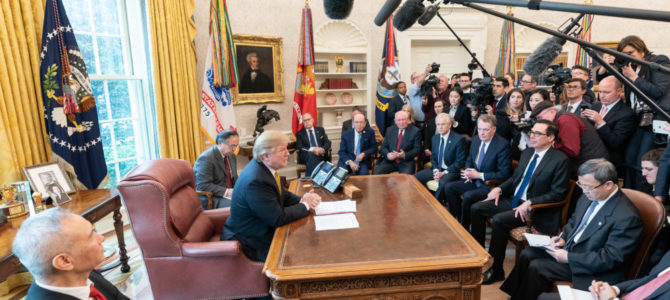
The U.S. economy is in trouble, and if you can believe it, that trouble isn’t simply the closure of Main Street, the massive number of nationwide layoffs, and the danger of financial crisis we’ve all heard about. As companies run out of cash, pushing them toward insolvency, our country’s business-to-business trust is at risk of coming apart — tearing and ultimately collapsing the delicate system that keeps industries as diverse as farming, chemicals, and aluminum profitable and solvent.
Just beyond — and in the midst of — the public health and financial liquidity crises is the expansive and potentially devastating solvency crisis. It won’t be solved by the Federal Reserve or Washington stimulus, although there is a way to draw from an important Depression-era lesson and hold it at bay.
While government and scientists across the planet rush to find a vaccine or treatment, the harsh medicine we’ve prescribed is turning off much day-to-day economic activity. Normal things like work or family trips, eating out, going to a bar, or even regularly driving our cars have all ground to a crawl and, in many instances, a complete halt.
America’s imperious airlines don’t inspire much public empathy, but they have run at a massive loss for weeks and over the course of a few months will become insolvent. The problem for the American public, beyond the obvious, is the airlines’ solvency crisis won’t stop with them, nor with our local shops, regular barbers, favorite restaurants and bars, or any of the other industries in the daily news. The solvency crisis is going to continue throughout the pandemic like an aggressive tumor, spreading deeper and deeper into the lifeblood of our economy.
Consider a mechanical-parts company. Say this company normally operates a machine shop that makes five or six critical replacement parts for the most widely used line of American tractors. These tractors service the farms that grow our food.
Under current economic assumptions, this company is safe from the turmoil. But what if I told you that only 70 percent of this company’s revenue comes from making those tractor parts and the other 30 percent comes from selling replacement parts for passenger planes and SUVs? People are neither flying nor driving at near-normal levels, meaning the parts company we thought was isolated from the hurt will struggle to profitably operate, slowly bleeding money over time as it limps through the coronavirus crisis.
Now consider the aluminum company that sells the raw material to the parts company. In a normal business atmosphere, they deliver aluminum and receive payment for delivery about 30 days later. The owner of the aluminum company now has a very important consideration: Will he continue sending aluminum to the parts company without getting the money up front? Likely not, given his customer’s difficulties. But the two have done business a long time, so instead of cutting the parts company off he might simply request payment in advance.
The problem is every other supplier the parts company does business with is making the same calculation and demanding payment up front as well. The parts company is losing money as it is, so is in no position to pay upfront for all its inputs. Without the supplies the company needs to make its parts, it makes none, meaning it has no sales, meaning it quickly burns through its little remaining cash and is left insolvent.
It doesn’t stop at the parts company. Consider a chemical company that sells chemical purifiers to the aluminum company. Its owner knows their client’s main customers are the parts companies that are struggling and closing all over the country. Will its owner send chemical products to the aluminum company?
Remember, the parts company normally operates a machine shop that makes five or six critical replacement parts for the most widely used line of American tractors. Those tractors are critical to our farmers, those farmers produce our food, and that food is sold on our shelves: The gutting of our manufacturing and middle class, brought right to the town grocery store.
This is the solvency crisis. It starts with the break of trust and rise of skepticism toward the profitability of each business as long as the coronavirus crisis continues. This skepticism makes financial conditions for every one of these companies worse, and accelerates businesses’ declines into insolvency.
The Federal Reserve has staved off a financial crisis, making massive loans to its banking partners to keep everyday transactions humming. But what of the insolvency crisis? While the generous business loans and grants in the very-important Senate package will help keep businesses on life support, will it hold the stitches of our economic fabric together?
Money for payroll, utility bills, and the rent won’t establish trust that the parts company can pay for its aluminum in 30 days, and the need for more and more bailout spending, at the incredibly high risk of inflation, continues as more and more small and mid-sized companies join them in insolvency.
The government could simply bail out the companies as they fail, as Washington is primed to do for massive corporations like the airlines, but the insidious danger the coming insolvency crisis poses to our economic ecosystem demands thinking ahead before we end up with a chain reaction that reaches right into the heartland and our ability to stock supermarket shelves.
So long as this chain reaction continues, we will not stop bailing out company after company, addressing symptom after symptom while missing the underlying breakdown powering our economic disaster.
A disparate group of financial and business professionals who have been tracking the virus’s global spread with growing alarm have suggested a solution to the looming insolvency crisis based on the FDIC, or Federal Deposit Insurance Company, best recognized as the logo we see when speaking to our bank teller. Chartered in the 1930s to restore “public confidence in the nation’s banking system,” the FDIC is a federal agency that uses mainly member fees to insure Americans’ bank accounts against disappearing if their bank goes under.
So how would it work? The owner of that aluminum company is hesitant to do business because he’s worried the parts maker will default on the bill, but what if the federal government will guarantee his losses if he keeps sending metal to the parts company? Now he’d be willing to send the aluminum, and the parts company can keep limping for a few more months while the scientists figure out how to beat the virus. The aluminum company, in turn, keeps getting supplied by its chemical company because the chemical company knows it is insured against loss as well.
We need to take the risk out of companies continuing to deal with each other in these dire circumstances, these analysts suggest, keeping thousands of business that are crucial to our economic health solvent and ready to hum back to life when our top-down shutdown ends.
“When one business looks at another and takes a guess at the likelihood they won’t pay a bill,” one businessman explains, “it is attempting to calculate the probability of default.”
If the federal government is willing to pay the tab should one of the companies you do business with collapse, it means your loss-given-default is zero dollars. By lowering the loss-given-default, the federal government is making it a lot easier for you to trust the companies you do business with. This means far fewer businesses will default because they continue to be extended trust by other businesses, and that means our economic infrastructure and jobs survive this coronavirus crisis.
“If we want our infrastructure to stand through this pandemic,” he continued, “we need a new, temporary FDIC that guarantees one business to another until the virus subsides. In so doing, we solve the trust-deficit disease.”
“I’ve seen this starting already,” a top corporate and nonprofit accountant warned. “I reached out to a person in the plastics industry and they’re starting to put increased pressure on their customers to have payment made up front. It’s already here, and it’s coming for the everyday consumer.”
None of this is easy. A forced economic shutdown is unprecedented in modern America. Fortunately, Washington has shown itself remarkably open to creative solutions, with senators like Marco Rubio leading the way in inventive legislation to keep our economy alive while it shelters in place.
But Washington, and the White House in particular, are also at risk of falling into a bailout mentality, whacking symptoms as they appear and missing the cancer in the bloodstream. A new and temporary insurance agency to maintain the trust at the center of a free economy is one of many crucial actions needed to stave off collapse.
Skill, capital and invention are the bricks of America’s economy, and trust is the cement. We must maintain that, especially in these darker hours.









